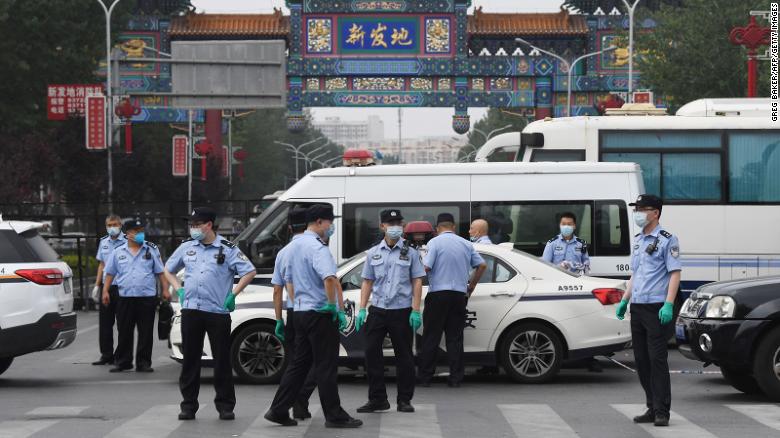- Click to share on Facebook (Opens in a new window)
- Click to share on Twitter (Opens in a new window)
- Click to share on LinkedIn (Opens in a new window)
- Click to email a friend (Opens in a new window)
Confinement for covid-19 outbreak returns in Beijing 2:45
(CNN) - Until last week, Beijing seemed to have drifted away from the coronavirus pandemic.
For 55 days, the Chinese capital had not reported any locally transmitted infections and life had returned to normal. Businesses and schools reopened, people returned to work, and public transportation and city parks were once again crowded.
But that façade of normality was shattered last week, when a new cluster of coronavirus cases emerged from an expanding wholesale food market, infecting more than 180 people as of Friday.
In a matter of days, the metropolis of more than 20 million people was put under partial closure. Authorities reintroduced restrictive measures previously used to combat the initial wave of infections, isolated residential neighborhoods, closed schools, and prohibited hundreds of thousands of people believed to be at risk of contracting the virus from leaving the city. Some 356,000 people have been evaluated in just five days.
People who had contact with the Xinfadi market lined up to be tested for coronavirus on June 17.
The outbreak of infections in Beijing, the headquarters of the Communist Party's power and previously considered among the safest cities in the country, is a clear reminder of how easily the virus can return to places where it was believed to have been tamed.
Five days before the start of the current outbreak, Beijing authorities had lowered the city's four-level public health emergency response alert level from Level 2 to Level 3. It was raised again to Level 2 on Tuesday night. .
Similar warning stories have occurred repeatedly in recent months, with governments rushing to contain reemerging outbreaks after apparently controlling for the number of initial infections.
South Korea, highly acclaimed for its success in containing the virus, has been battling a surge in infections since late May after easing rules on social distancing and reopening of schools. Singapore had been considered a success story in managing the coronavirus until a wave of infections erupted in April among migrant workers living in crowded dormitories.
MIRA : What would be the impact of a second covid-19 outbreak on the global economy?
Second wave of infections
In China, the initial wave of infections was largely contained in late March, largely thanks to radical closure measures that stopped much of the country. As the outbreaks worsened in other countries, China closed its borders to most foreigners, imposed strict airport controls and quarantined all returning Chinese citizens. Despite preventive measures, groups of local infections still emerged in the northeast of the country in April and May, all related to imported cases.
But the current outbreak in Beijing is the worst coronavirus resurgence so far, and authorities are still trying to locate its source.
Previously, reports linked the outbreak to seafood or meat, after traces of the virus were detected on a cutting board used by a market-imported salmon vendor. However, there is now concern that the virus has quietly spread for weeks before being detected for the first time.
Xinfadi Market, the largest wholesale food market in Beijing, is at the center of the latest outbreak in the city.
"This outbreak in Beijing probably didn't start in late May or early June, but probably a month earlier," said Gao Fu, director of China's Centers for Disease Control and Prevention (CDC), at a meeting in Shanghai on Tuesday.
"There must have been many mild or asymptomatic cases (on the market), that's why the virus has been detected so much in that environment," he said.
Evidence from the United States suggests that between 25% and 45% of infected people probably have no symptoms, with epidemiological studies showing that those people can transmit the virus to someone who is not infected.
In recent months, some Chinese health experts have warned against a possible second wave of infections, even as Chinese state media repeatedly touted the government's success in containing the outbreak and contrasting it with the failures of western governments.
In an exclusive interview with CNN in May, China's top respiratory expert, Dr. Zhong Nanshan, warned that China still faces the "great challenge" of a possible return of the virus, and that authorities should not be accommodating.
"Most ... the Chinese at this time are still susceptible to covid-19 infection, due to lack of immunity," Zhong said. "We are facing (a) a great challenge, it is not better than the foreign countries that I create at the moment."
READ : What is the difference between asymptomatic and presymptomatic spread? Does it matter with the coronavirus?
Outbreak "under control"
The outbreak in Beijing will be the latest test of China's coronavirus containment strategy.
On Thursday, Wu Zunyou, chief epidemiologist at China's CDC, gave a victorious tone, declaring that the outbreak in Beijing is already "under control."
Wu said there are still likely to be new confirmed cases related to the market in the coming days, but not likely due to a new transmission.
"The newly diagnosed cases that are reported every day are not equivalent to new infections and the outbreak under control does not mean that there will be zero new cases tomorrow," Wu said.
“There will be cases reported tomorrow and the day after tomorrow. These reported cases are the process of detecting previous infections. No new infections. New infections are sporadic, "said Wu.
The chief epidemiologist said it was not unexpected to see a new outbreak in Beijing, given the large number of new global cases.
"As long as there are risks of imported cases, imported infections and small-scale clusters caused by imported infections can occur anywhere in China. From this point of view, (the Beijing outbreak) is normal, ”he said.
CNN's Steven Jiang contributed to the reports.
Beijing








